On the outside, the small two-story house that stood on an otherwise quiet street in Sheepshead Bay, Brooklyn, seemed deserted.
But from the sidewalk, the sounds of drills and banging hammers rumbled inside. When a worker opened the door, nearly a dozen migrant men appeared. Most were from Ecuador, and were dressed in work boots with paint splattered on their pants. They said they worked 8-hour days — sometimes longer — in close quarters without any safety equipment.
Despite the two stop work orders plastered on the house’s front door, their work continued undisturbed. Issued by the New York Department of Buildings, the stop work orders instructed all construction on the premises to halt until the proper permits were acquired and a $6,000 fine was paid.
Almost all of the workers were recent arrivals who had made it to New York in the past few years or months and didn’t yet possess work authorization. Regardless, they kept working.
“We know that the work doesn’t have a permit,” one worker, who spoke on the condition of anonymity, said that day. “But out of necessity, we stayed.”
Also Read: What Is Wage Theft?
Several of the migrants at the house said that they had spent days working without receiving their full pay. And all of the workers interviewed there said they were initially lured there with the promise of steady work from one man: Francisco Giron.
Despite the stop work orders, the men that day said they were cautioned by Giron to look out for people who could see them working. One worker recalled Giron telling them: “You all know that the work is happening without a permit, so always keep the doors closed and be careful, don’t open for anyone.”
Giron appears to operate as a construction contractor — though he denies being one. Former workers hired by Giron describe him as a labor broker, providing cheap labor to construction sites. Migrants told Documented they heard of him through word of mouth, with his number shared widely on WhatsApp among Ecuadorian and Venezuelan communities of recent arrivals. According to more than a dozen migrants who spoke with Documented and worked with Giron at various points since last year, he would recruit them to work on construction projects primarily in Brooklyn, but within weeks would end up owing them anywhere from hundreds to more than a thousand dollars in wages.
State records show that Giron’s pattern of alleged wage theft has existed for nearly a decade, as several former workers have accused him of stealing their wages, and Giron and the companies associated with his name owe tens of thousands of dollars to workers and the state from as far back as 2015.
A New York State Department of Labor investigation in 2017 found that a company connected to Giron, 4 Giron Construction Inc., stole more than $5,800 in wages from three workers in 2015 and 2016. With incurred interest, liquidated damages, and civil penalties, the DOL ordered Giron to pay more than $22,600. According to the DOL, Giron has failed to pay.
Another DOL investigation in 2018 found that Giron and 4 Giron Construction Inc. stole $4,900 in wages from a worker in 2015, according to state records. Taking into account incurred interest, liquidated damages, and civil penalties for the case, Giron still owes more than $22,800 in that case, according to the agency.
In response to a Documented inquiry, the DOL stated that it has “proactively contacted [Giron] several times but he has not been responsive. The employer’s representative has not communicated with NYSDOL since 2022.” They also said that they currently have two outstanding judgments against Giron.
According to several interviews with current and former workers, Giron guaranteed migrants that he would pay them from $100 to $180 per day, largely in cash. He would have them paint buildings, put up scaffolding, and redo the floors of houses, among various other tasks. But when the end of the week came, Giron would often come up short, only paying the workers for part of the week. The next week, it would usually be even less.
As the weeks went on, a clear pattern emerged: less and less pay, despite working a full work week. Workers said that Giron paid them largely in cash, did not give them pay stubs, and never asked them for work authorization or for proof of Occupational Safety and Health Administration (OSHA) course completion. According to workers, Giron did not provide safety equipment like harnesses, helmets, and filtered masks.
The workers’ allegations point to clear violations in federal immigration law that state employers must only hire those who have official U.S. work authorization. According to the New York Labor Code, employers are also required to provide their workers involved in construction with safe working conditions and personal protective equipment.
When migrants worked longer days or on holidays, Giron did not pay them overtime, several workers said. The wages they were owed continued to pile up — and so did the excuses from Giron about why he hadn’t paid them, migrants said. Some workers said they were eventually paid back, in full, but in increments — weeks or months after they were owed their wages, and after a Documented reporter had begun contacting them.
Still, for several workers, months have now passed since they stopped working with Giron, and they are still owed hundreds or more than a thousand dollars, migrants told Documented.
“We never guessed that it was a trick of his that he was playing,” said Manuel Agurto, a migrant who worked for Giron for about three months, on and off, in the fall and summer of 2023 at a house and two schools in Brooklyn.
A documented pattern of stolen wages
Giron, and entities tied to him, owe roughly $121,700 to three different state agencies for a mixture of wage theft, added penalties, interest and damages — and a failure to pay workers’ compensation insurance or claims, according to a number of records from the DOL, the New York State Workers’ Compensation Board and the New York State Insurance Fund.

Giron appears to have entrenched himself into communities of new arrivals who are determined to find work no matter the circumstance. Approximately 190,000 migrants arrived here in the past two years, and for many securing work has been a top priority, and also one of the most challenging endeavors, particularly with long waits to obtain work authorization.
Despite these mounting judgments from various state agencies, Giron continued to recruit workers for construction sites and allegedly underpay them, years after agencies like the DOL and the Workers’ Compensation Board concluded that Giron owed tens of thousands of dollars.
Employment law experts told Documented that they often see this kind of inaction from the DOL after an investigation or judgment concludes. “The Department of Labor lacks the resources it needs to prosecute wage theft cases in a thorough and timely manner,” said Richard Blum, a staff attorney for The Legal Aid Society’s Employment Law Unit. “And workers lack the tools needed to prevent wage thieves from transferring and hiding their assets while the slow investigations are underway.”
Also Read: 127,000 New York Workers Have Been Victims of Wage Theft
Mel González, the project director for the New York Legal Assistance Group (NYLAG) Employment Law Project, said that he has cases where the DOL has ordered an employer to pay his client, but there’s no further action taken against the individual. Sometimes, agencies like the DOL can’t locate a bank account or have trouble contacting the individual directly because they won’t pick up the phone, González said.
“So what looked like a victory for us, is meaningless,” González said. “I can tell my clients, ‘Hey, so we won the case. They owe this amount of money. But we don’t really know how to collect.’ ”
Giron has not only evaded serious repercussions from agencies like the DOL, but has also continued to fly under the radar of law enforcement. A spokesperson from the Brooklyn District Attorney’s Office said their office hasn’t received any complaints or referrals about Giron or his related entities. The New York State Attorney General’s Office also does not have any complaints related to him, a spokesperson said.
To investigate and prosecute corruption in the construction industry, last year, the Manhattan District Attorney announced the expansion of the Construction Fraud Task Force unit. In Brooklyn, the DA’s Office has a Construction Crimes and Labor Fraud Unit that handles wage theft cases, Oren Yaniv, a spokesperson for the office, said. The majority of the cases involve construction workers, and the office prosecutes when there is evidence of criminal conduct, focusing on “holding offenders accountable,” Yaniv said.
On the ground, worker’s rights organizations are sounding the alarm about the rise in wage theft among immigrant New Yorkers. Ligia Guallpa, executive director of the Worker’s Justice Project (WJP), said that her organization has been struggling to address the influx of wage theft cases that have come into their office. Many of the new cases have been asylum seekers.
“We usually have 10 to 20 workers come into our office a month but just this past month we got 60 cases of wage theft,” she said. “The majority being in the construction industry and almost 70 percent of them being newly arrived immigrants who have arrived [to New York] a year or less ago.”
According to Guallpa, employers like Giron are not uncommon in the residential construction industry.

“Residential construction is considered lower-end construction, which means any site that is 10 floors or less,” she said. “There is less oversight and less priority. Most of the work is done without permits or the sites are far away from the center of the city so many of the contractors at those lower-end sites happen to be more abusive and exploitative employers.”
When Documented asked for comment about the tens of thousands of dollars Giron owed various state agencies, Giron said in a March phone interview in Spanish that his insurance was “investigating” the situation and looking into it, and that he was seeking legal counsel.
Giron maintained that he was unaware of the tens of thousands he owed to the DOL until we brought it up to him. But Giron was aware that he had not paid the worker’s compensation judgments against him, he said. “If you lend me [money],” he told us, “I’ll do it.”
Besides the plethora of judgments made against him by several state agencies, Giron also has two lawsuits against him and the company tied to his name, 4 Giron Construction Inc., both of which were filed in 2022. In both cases, the plaintiffs allege that Giron failed to pay the workers — five workers in one court case and two in the other — for weeks of work, including overtime, according to the complaints.
In the two cases, the plaintiffs filed requests for default judgments against Giron or 4 Giron Construction Inc., according to court documents. The motion is still pending in one of the lawsuits. In April, the court granted a judgment against Giron in the other case, ordering him to pay more than $70,600 in total to the five plaintiffs.
Giron has failed to appear in court for either case, records show.
Giron declined to comment on the specifics of the court cases but said that he had been advised not to show up in court for his appearances. He said his attorney would deal with questions about the court case, but then declined to provide Documented with any information about his attorney. An attorney is not listed for him in the civil cases against him.
“I don’t know what they’re going to sort out, and I’m not interested for now,” Giron said about the court cases.
Agurto, who came to New York from Ecuador with his family in early June of 2023, says Giron still owes him about $1,900 at the agreed-upon rate of $120 a day and overtime pay. Giron previously owed him more, Agurto said, but started paying him back after Documented began interviewing Agurto and other workers.
Agurto’s wife, Felisa Moreira, and her brother, Ivan Moreira, also came to work for Giron. Felisa only worked three days with Giron, but Giron never paid her for those days, she said, and her brother Ivan said that Giron still owes him about $800 in wages. At the time, none of the family members had work authorization. In New York City, the family thought that “you would work extremely hard, but that you would get paid well,” Felisa said in Spanish during a recent interview at the Bronx apartment she shares with Agurto. “But it’s not like that,” she added. “People always want to abuse migrants.”
“The desperation takes over”
Despite Giron already allegedly owing Agurto and the rest of his family money after their first week of work, Agurto decided to continue working for Giron. At least he was earning a few hundred dollars here and there, rather than no work at all, after months without employment, Agurto said. “The desperation takes over,” he said in Spanish. “We always heard that work here was always essential, we never imagined that we also had to be careful with people.”
Several workers said they decided to keep working under Giron even as the wages they were owed accumulated, largely because other options seemed slim — and for fear of never obtaining the wages they were owed.
“If I leave, that money is lost. That’s why I think all of us are still here,” one migrant from Ecuador said in a February interview, while he was still working for Giron at the home in Brooklyn, as the house had stop work orders plastered on the door. The worker spoke on the condition of anonymity and said that he was owed part of his wages. “None of us like working with that doubt: Will he [Giron] pay me, or not? It’s bad to work like that.”
Also Read: Wage Theft Prevention: Know Your Rights at Work

Many of the workers who spoke with Documented said that at first, they tried to give Giron the benefit of the doubt, hoping that eventually, he would make good on what he owed them. But as time went on, one worker from Guatemala, who spoke on the condition of anonymity, said he realized something about Giron: “It’s not a coincidence that he fell behind [on payments], but it’s actually that he lives like that.”
In the interview with Documented, Giron acknowledged that he still had not paid Agurto, Felisa, and Ivan all of their unpaid wages. “I owe them three,” Giron said. The workers could visit his attorney’s office, sign papers, and “pick up their check,” Giron said. But Giron again declined to say who his lawyer was, or give additional information about this deal.
He insisted that he had paid back several other workers Documented spoke to, and that he had “proof” of his payments. When Documented asked to view evidence of those payments, Giron declined.
Giron confirmed that he pays workers in cash and that he did not give workers pay stubs. He acknowledged that he did not request work authorization or proof of OSHA course completion. “I’m not immigration, nor am I the police,” Giron said. “Why would I have to ask for their [workers’] papers, why?”
He denied that those he employed ever worked overtime, and said he always told workers that it was optional to work on weekends — but that he tells workers it was a “regular day” for him. Giron said that he always provided the safety equipment workers needed, like helmets, gloves, and glasses. Still, Giron claimed he was not a contractor and did not recruit people to work for him, despite more than a dozen migrants describing his work as that of a contractor. Giron described himself as “a simple, run-of-the-mill worker, like thousands that are here in New York.”
“I am just the source of the money between the owner and the worker,” Giron insisted.
Giron asserted throughout the interview that he was just trying to help workers find jobs and that he didn’t have a “reason to rob” money from anyone. Sometimes, he said, owners of houses he worked on didn’t pay him fully, and that the work didn’t go as planned, so he occasionally came up short on wages for the workers. “If I haven’t given them [their money], it’s because I haven’t had it. It’s because it’s gone badly for me. It doesn’t go well for everyone,” Giron said.
Giron lamented how he was being portrayed by the workers who spoke with Documented. “The boss is always the bad guy,” Giron said. “I am really good compared to too many bosses.”
Workers fight back
Salvador Lister Alava Loor heard of Giron how so many others had: through word of mouth, exchanging WhatsApp messages with fellow Ecuadorians. “Do you want to work?” Giron told Loor in a December voice message in Spanish, shared with Documented. “Come over here, call other guys to come. Come all at once, let’s go work now.”

Loor, 25, worked for Giron for about 15 days, but he was paid only a few hundred dollars, he said. Giron still owes him about $1,200 in wages, not including overtime and holidays he worked, Loor said, even though he stopped working for Giron in early January.
“He [Giron] spent all day giving us orders, exploiting us,” Loor said in Spanish. “He screws us over at work. He tells us he’s going to pay us today, and nothing. He makes us wait three weeks, and nothing.”
Giron acknowledged that he owes Loor $1,200. He alleges that Loor began to send him threats over text messages asking for his money. Now, Loor would have to go through Giron’s lawyer to receive the money, Giron said. When asked for proof, Giron declined to provide any evidence of the threats or the name of his lawyer.
At The Legal Aid Society, experts stress that no matter someone’s work authorization status, workers are entitled to minimum wage, overtime, and notices each pay period stating what their wages are, said Elizabeth Saylor, the citywide director of the group’s employment law unit. But even for those immigrants who do know what their rights are, there are a host of other concerns.
“You’re living paycheck to paycheck, and you’re in a very vulnerable position that you want to be able to buy food for your family, pay rent, get out of the shelter. And so you’re afraid to speak and come forward,” Saylor said. “I think the construction industry is probably in part harder because if you’re going from location to location, it’s harder to pin down who you work for, or who the overarching company is.”
Several workers were nervous to speak with Documented reporters for fear of repercussions. Others who were employed by Giron have been organizing themselves trying to find more information about him, and recover what they say are stolen wages, creating a WhatsApp group called “Report Francisco.”
Some workers said in the group, and in various interviews, that they sought assistance from police, only to be turned away. Others say they personally attempted to confront Giron, but that he has continued to avoid them.
Even if the workers were able to successfully file a claim with the DOL and win back pay, the agency has a poor track record of recovering stolen wages. Until now, Giron has avoided paying the DOL any of the money he currently owes. Guallpa, from Worker’s Justice Project, said that to prevent wage theft in the long term, state and city agencies need to look at the situation with a multi-level approach.
“There needs to be more aggressive enforcement and a co-enforcement model where these agencies are working hand in hand with community organizations that are doing the intake and building the trust relationship with the workers to come forward,” she said.
Giron is aware that workers have been looking for him and that they have formed a WhatsApp group, but he dismissed these actions, saying in the interview that they were just trying to get money from him.
“These people, for $100, $200 pesos, maybe, they’ll do anything,” Giron said.
Loor told Documented that since January, he has been waiting for Giron to pay him his back wages. In the meantime, Loor moved to Florida, where he hopes to find work, but he hasn’t forgotten Giron or the money Loor says Giron owes him. In early February, Loor made several unsuccessful attempts to get his money back, calling and texting Giron, messages that Loor shared with Documented. “Listen,” Loor wrote in Spanish over WhatsApp to Giron. “Pay us, Dom Francisco.”
Giron responded immediately, saying that he hadn’t had the money. “What do you want me to tell you,” he said.
If you suspect your wages have been stolen as a worker, read Documented’s resource guide about agencies and organizations that can help.





